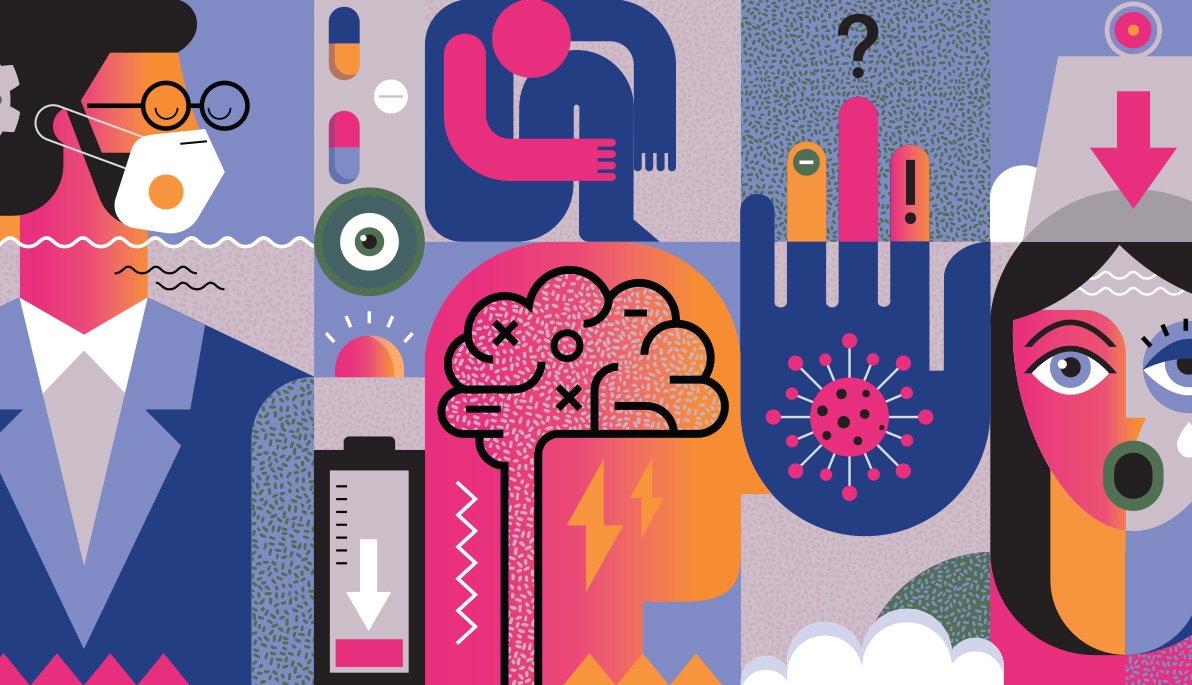
Discussing Collective Trauma and Mental Health
January 25, 2022
Liat Jarkon, D.O., director of the College of Osteopathic Medicine’s (NYITCOM) Center for Behavioral Health and assistant professor of family medicine, was one of several experts featured in a Blank Slate Media virtual forum about the impact of the COVID-19 pandemic on Long Island’s mental health crisis.
Jarkon was joined on the January 20 panel by Jeffrey Reynolds, Ph.D., president and CEO of the Family and Children’s Association, and Andrew Malekoff, former executive director and CEO of the North Shore Child and Family Guidance Center.
The discussion was moderated by Blank Slate Media publisher Steven Blank, who kicked off the event by asking the panelists to address a recent report issued by U.S. Surgeon General Vivek Murthy, which noted the devastating health effects today’s youth is facing as a result of the pandemic. As noted in the report, in early 2021, emergency department visits in the United States for suspected suicide attempts increased by 51 percent among adolescent girls and four percent for adolescent boys, compared to the same period in 2019.
Jarkon weighed in on the impact of social media on young people’s mental health during this time. She noted that as young people’s daily routines were “flipped upside down” and they were forced to isolate or spend time in quarantine, social media likely provided an outlet to the outside world. However, the additional time spent on social media could have exacerbated existing mental health issues. In addition, the pandemic has placed an enormous strain on many working parents, who may be preoccupied with addressing employment and financial stress, leading children to rely more on social media for interaction. In addition to placing limits on the amount of time that children spend on social media, Jarkon recommended that parents implement a designated family time, such as a weekly family game night, which can encourage more interaction and communication with children.
She also noted that the pandemic has placed the world under collective trauma (reactions to a deeply distressing event that affects an entire society), not unlike generations who have lived through a war. In addition to the anxieties caused by the coronavirus, today’s children have witnessed extreme divisiveness and a lack of solidarity from adults—from debates on vaccines and mask mandates to political tensions and aggression in public settings, such as airplanes and school board meetings. Jarkon notes that because of the collective trauma, “people are internalizing all of this anger, and they’re looking for ways to release it.”
Blank noted that many prisoners in New York City prisons and similar correctional facilities suffer from mental illness, which led experts to explain that many of these individuals need help, not handcuffs. With the uptick in pandemic-related mental health incidents, police and law enforcement officers have responded to a growing number of 911 calls. Now, as Jarkon noted, a new 988 number designated by the Federal Communications Commission will reduce the burden on law enforcement and allow those in need to be connected more quickly with trained mental health professionals.
In addition, Jarkon also cited the demand for more trained mental health professionals and the dire need for parity in insurance coverage, a topic that she also addressed in a 2020 Fortune op-ed.
“What we need is for the government to step up. We need them to step up and give incentives for people to go into psychiatry and mental health work in general. We need them to pay—and to pay appropriately—the same to a psychiatrist and a mental health counselor as they do to a cardiologist.”
At the conclusion of the panel, all three experts agreed that if family members or friends suspect that a loved one is struggling, they should not be afraid to ask if that loved one needs help.
Watch the full discussion.
NYITCOM’s Center for Behavioral Health is located on the first floor of the Academic Health Care Center in Riland. Medical and School of Health Professions community members in need of support should contact 516.686.1300 or email centerforbh@nyit.edu.
New York Tech students, faculty, and staff in need of support should contact Counseling and Wellness in Long Island (516.686.7683) or New York City (212.261.1773) to talk or make a virtual appointment.
More Features

An Alumnus’ Commitment to the Environment
As an energy management graduate from New York Tech’s Vancouver campus, Jasdeep Gulati (M.S. ’22) is highly invested in educating people about environmental and climate sustainability.

Vancouver Faculty Win University-Sponsored Research Awards in New Program
The new Global Impact Research Grant (GIRG) program has been developed to keep Vancouver-based faculty connected to faculty and research projects being conducted on the university’s New York campuses.

Studying Climate Change One Degree at a Time
Junhua Qu (M.S. ’24) began her collegiate journey in Beijing. But, her interest in climate change took her to New York Tech’s Vancouver campus to study energy management.
